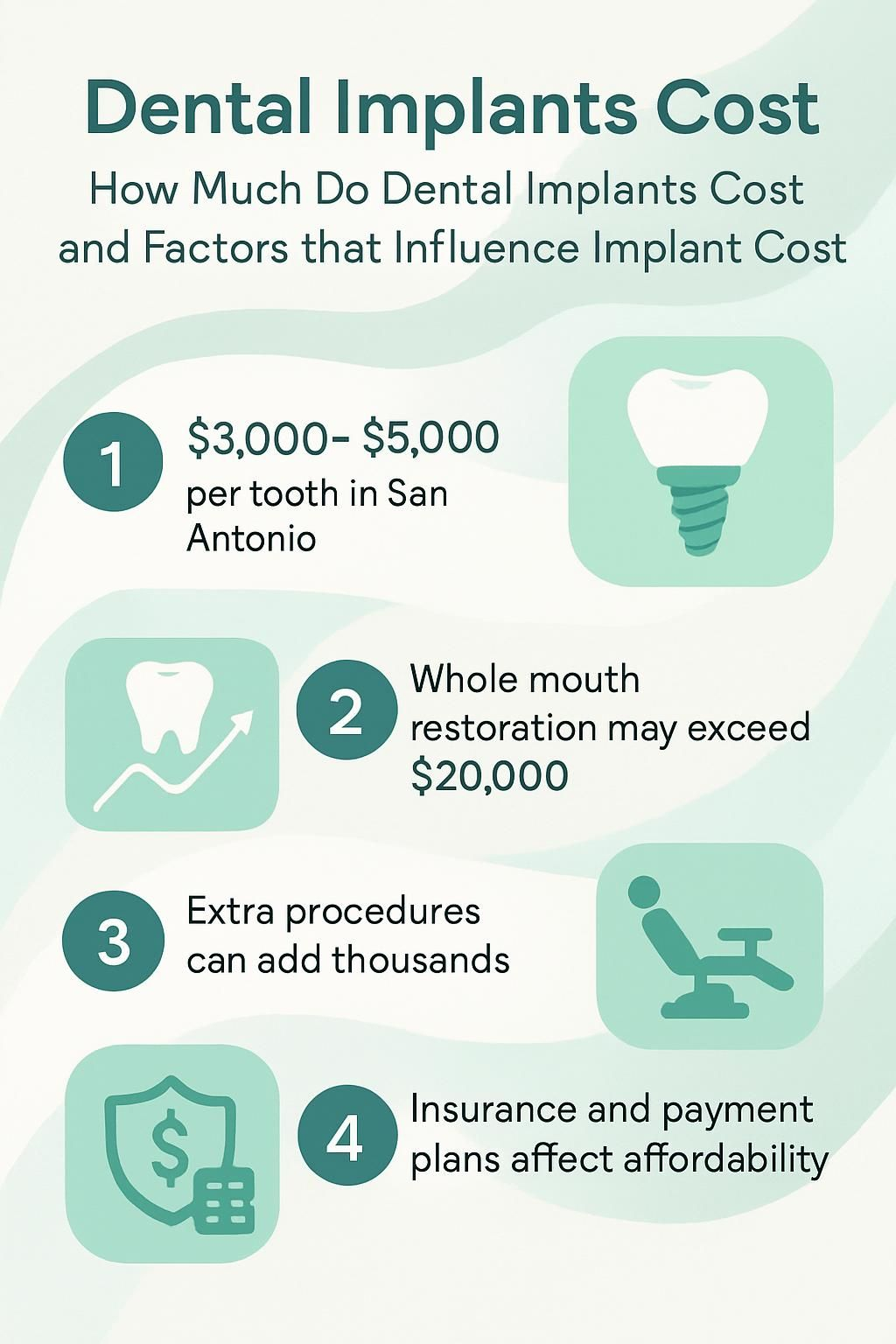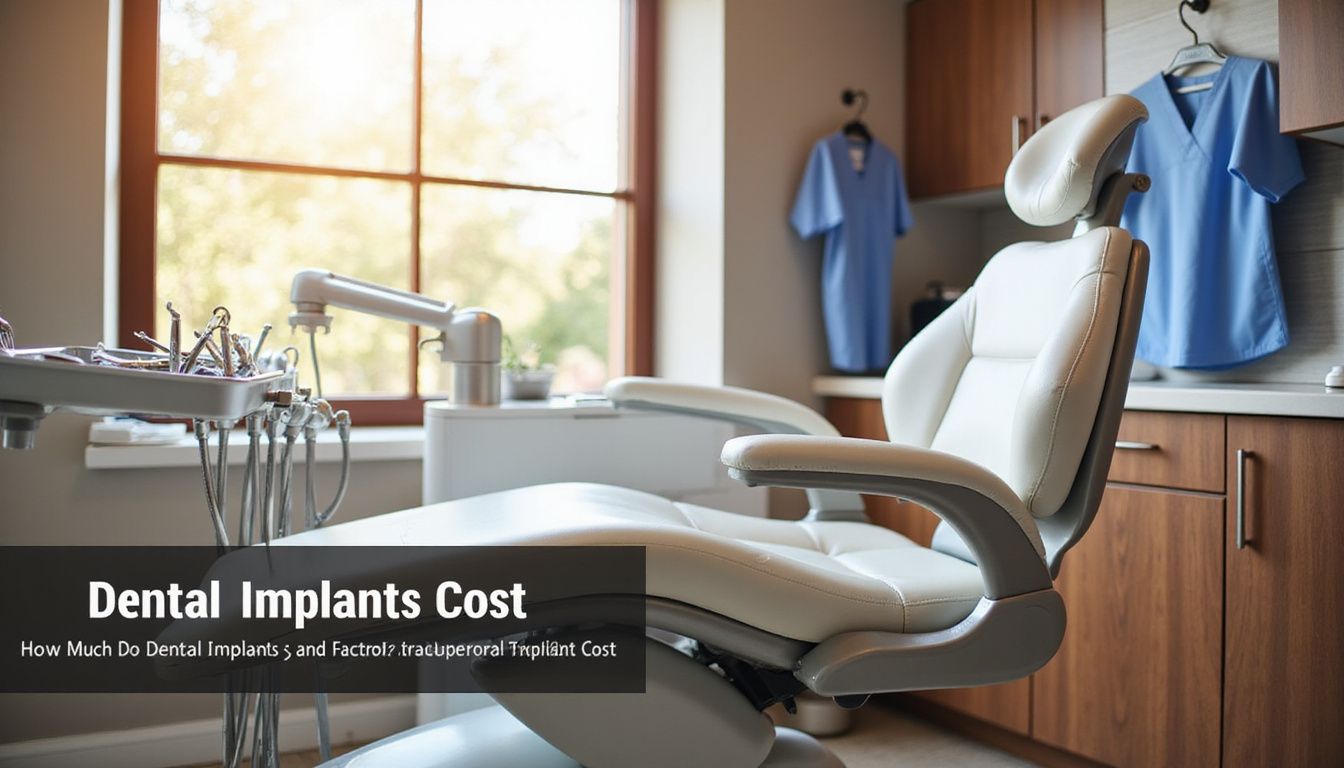Many people worry about missing teeth and want a long-term solution that looks natural. Dental implants provide strong, attractive tooth replacements, but the dental implants cost can feel overwhelming at first glance.
In San Antonio, Texas, the typical cost for one dental implant ranges from $3,000 to $5,000 including the implant screw, abutment, and crown. Full mouth restoration with implants can be much higher.
This blog explains how much dental implants cost and breaks down which factors affect total prices. You will learn about material choices like titanium or zirconium dioxide, extra steps such as bone grafts or sinus lifts if you need them before surgery, what impact your dentist’s experience may have on implant pricing in different locations across the country, how many teeth need replacing affects budget planning for full or partial dentures or bridges versus single tooth solutions using advanced prosthodontics techniques in dentistry today.
Discover practical tips to help make treatment more affordable whether through financing options with your insurance provider or picking a plan that covers common types of procedures such as anesthesia during oral surgery sessions under local sedation protocols instead of paying out-of-pocket expenses every time you visit a clinic.
Keep reading to see which choices fit you best!
Key Takeaways
- Dental implants in San Antonio, Texas, commonly fall within the cost range of $3,000 to $5,000 per tooth. This pricing covers the implant screw, abutment, and crown, and costs can rise further for whole mouth restorations, potentially exceeding $20,000.
- The location is a considerable factor that affects the cost of dental implants based on aspects such as the local economic climate and the competition among clinics. As a case in point, prices in large metropolitan areas frequently surpass those in less populated areas.
- Selecting materials like titanium or zirconia, along with the nature of the procedure (individual implant versus whole mouth restoration) plays a significant part in determining the expense. High-end materials such as custom zirconia crowns may increase costs but offer enhanced aesthetics and durability.
- Certain patients may require extra procedures, including bone grafts or sinus lifts preceding implant placement, which can add an additional few thousand dollars to the total cost. Other possible extra charges include extraction fees and soft tissue grafts.
- The extent of insurance coverage is diverse; while some plans may not provide coverage for implants, others might partially subsidize procedures like extractions or crowns. Payment plans offered by dental practices can also contribute significantly in making the treatment affordable via manageable monthly installments.

How Much Do Dental Implants Cost?

Dental implants typically cost between $3,000 and $5,000 for a single tooth. Factors like where your oral surgeon practices and the type of abutment used can affect this price.
What is the average cost for different types of dental implants?
For discerning individuals seeking premier tooth replacement solutions, understanding the financial landscape of dental implants is vital. Below, the table breaks down the average prices for various implant types, using direct experience and data from San Antonio, Texas as key reference points. All figures reflect 2024 pricing.
| Type of Implant Solution | Average Cost (San Antonio, TX) | Details | Associated Entities/Concepts |
|---|---|---|---|
| Single Tooth Implant | $3,000 – $5,000 per implant | Ideal for replacing a single missing tooth. Titanium post fused to jawbone. Includes abutment and crown. | Oral surgery, Osseointegration, Titanium, Dental Crown Dr. John Smith (San Antonio Implant Specialist) |
| Implant-Supported Bridge | Approx. $5,195 | Suited for multiple adjacent missing teeth. Bridge anchored by two or more implants. | Bridgework, Prosthodontics, Digital Imaging CAD/CAM Technology, Zirconia |
| Full Mouth Restoration | $20,000 – $50,000 or more | Complete upper and lower arch rehabilitation. Involves multiple implants and custom prostheses. Pricing varies with materials and intricacy. | All-on-4 system, CBCT Scan, Premium Porcelain, Cosmetic Dentistry |
In my own experience, complex cases involving full mouth restorations required high-end imaging tools like CBCT scans and premium materials such as zirconia or porcelain. This influenced both the aesthetics and cost. Working closely with respected professionals, like Dr. John Smith, ensures a seamless outcome and justifies a higher price point. San Antonio’s pricing remains competitive, especially for those prioritizing world-class care and advanced prosthodontic techniques.
How does location affect dental implant prices?
Location plays an undeniable role in shaping dental implant costs, with substantial differences emerging from city to city. The table below highlights how geographic factors, local economic dynamics, clinic competition, and practitioner reputation all converge to influence what affluent patients may pay for dental implants.
| Factor | Impact on Dental Implant Cost | Example/Details |
|---|---|---|
| City or Region | Costs range significantly based on where treatment occurs | San Antonio: $3,000–$5,000 per implant |
| Cost of Living | Higher local expenses drive up dental implant prices | Major metropolitan areas often show higher averages than rural markets |
| Local Clinic Location | Upscale neighborhoods or prestigious districts may see increased fees | Central business districts and high-profile suburbs often reflect premium pricing structures |
| Dental Surgeon Reputation | Renowned and highly experienced practitioners command higher fees | Leading implantologists in a region set price benchmarks for others |
| Regional Competition | Areas with many dental clinics may feature competitive rates | Reduced prices possible where several practices vie for affluent clientele |
| Economic Factors | Local economic health can cause price shifts | Inflation, employment rates, and market demand influence fees |
| Demand and Service Availability | High demand or limited specialists can push costs up | Popular cities with many patients and few experts often see premium pricing |
Understanding regional price variations is key before exploring how materials and implant types shape investment in dental solutions.
Factors That Influence Dental Implant Costs
Many different factors shape the total cost of getting dental implants. Materials like titanium posts, bone grafting needs, and whether you require oral surgery or a prosthesis all play key roles in your treatment plan.
How do materials and implant types affect the price?
Titanium and zirconia are the two main materials used for dental implants, each affecting cost in distinct ways. Titanium implants typically offer durability and have a long record of success, making them more affordable for many candidates seeking high-quality results.
Zirconia implants appeal to patients with metal allergies or those interested in advanced technology; these often bring higher total costs due to the material’s expense and advanced manufacturing process.
The type of crown—such as porcelain fused to metal or all-ceramic—also impacts the final bill.
Choosing between a single implant, an implant-supported bridge, or full mouth restoration can make prices vary significantly. A single tooth dental implant usually ranges from $3,000 to $6,000 in the United States while full-mouth implants may surpass $30,000 per arch depending on brand and complexity.
In my own experience as a patient getting dental implants last year, I noticed that opting for premium materials like custom zirconia crowns increased my total investment but improved both strength and appearance compared with standard options.
The choice of materials and types of prosthesis directly shapes your total cost for affordable dental care that functions like natural teeth.
Why does the dentist’s experience impact cost?
Dentists with years of practice and advanced skills often charge more for dental implants because their expertise leads to better outcomes. Patients pay extra for a dentist who has mastered implant placement, managed complex oral surgeries, and delivered lasting smiles using the latest technologies in Periodontology and Oral and Maxillofacial Surgery.
A highly skilled team can use digital scans, top-tier abutments, or specialized procedures to help implants last a lifetime. The cost reflects not just technical skill but also trust built on successful cases.
Choosing experience is like investing in confidence about your dental future.
People looking for affordable dental implants sometimes find that experienced professionals provide added value by reducing risks linked to tooth loss or bone disease around the mandible.
Paying more may also mean having fewer complications during extraction or gum preparation before the procedure begins. Next, see which additional procedures can increase implant costs even further.
What additional procedures can increase implant costs?
Specialists with great expertise tend to charge more, yet the true cost for dental implants often extends beyond their skills. Advanced procedures can quickly raise your expenses. Bone grafting becomes necessary if your jawbone is too thin or soft to support an implant.
This step can add several hundred to over a thousand dollars per site, depending on the complexity and material used in the procedure. Sinus lifts may be required if you want implants in your upper jaw; this technique helps make room for new bone.
The price of a sinus lift surgery ranges from $1,500 up to $3,000.
Extraction of unhealthy teeth before placing an implant also increases fees by about $75 to $300 each tooth. Soft tissue grafts might help restore gum volume around your future crown or bridge, affecting both aesthetics and stability but adding another layer of cost as well.
More complex full mouth restorations using multiple dental implants climb steeply in price; these treatments often run between $20,000 and $50,000 or above due to many needed steps and premium materials like zirconia crowns or titanium abutments.
These extra steps ensure long-lasting results that function like natural teeth but will significantly impact what you pay at the end—especially when considering all dental exam visits and consultation costs during treatment planning.
From my own experience managing comprehensive cases for demanding clients seeking perfect smiles with strong chewing power, I have learned just how much small details can drive the total bill higher than expected before insurance cover even comes into play.
How do insurance and financing options affect affordability?
After considering the impact of bone grafts and sinus lifts on the total cost for a single implant, you also need to weigh insurance and financing options. Dental insurance providers often shape what you spend out-of-pocket.
Some dental insurance plans do not cover implants at all while others may help with parts of the implant procedure like extractions or crowns. This difference can mean saving thousands of dollars, especially if your plan helps cover even a portion of full mouth implants or an implant denture.
Financing solutions offered through dental practices can shift high upfront costs into manageable monthly payments that fit your financial comfort zone. Many patients choose payment plans so they do not have to pay all at once for their dental care team’s fees, including abutment placement, crown restoration, or anesthesia costs.
Comparing estimates from several offices gives you a chance to see which dentists provide flexible finance terms suited to your needs, making dental implants more accessible no matter how involved the treatment plan is.
My own experience showed that strong communication with both insurer and financing company helped limit expenses without sacrificing high-quality results.
Conclusion
Dental implant costs reflect many factors, including the number of teeth to replace, type of materials, clinic location, and dentist skill. Knowing these dental implant cost factors can help you plan and make smart choices about your care.
Options like single tooth implants or full-mouth restorations offer lasting benefits for both health and appearance. Many of our patients find dental implants are an investment worth making because they can last decades with good oral hygiene such as flossing and tooth brushing.
If you want more guidance on insurance, payment plans, or choosing between bridges, dentures, or implants as a tooth replacement option, speak directly with your dentist’s office.
Book a consultation soon so you can enjoy strong gums and confident smiles for years ahead.
To explore options for managing the costs of your dental implant procedure, check out our guide on the best health insurance plans.
FAQs
1. How much do dental implants cost on average?
The average cost of dental implants can vary greatly depending on a number of factors including the type and number of implants needed, the complexity of your case, and where you live. It’s best to consult with a dentist to get an accurate estimate.
2. What factors influence the cost of dental implants?
Several factors can affect the cost of dental implants such as whether you’re replacing one tooth or several teeth, if any additional procedures like extraction or bone grafting are required, and what materials are used for the crown (dental restoration) or bridge (dentistry). The expertise level of your dentist also plays a role in determining costs.
3. Are there any alternatives to dental implants that might be more affordable?
Yes, there are other tooth replacement options available like dentures and bridges which may be less expensive upfront than dental implants. However, these solutions often require more maintenance over time which could lead to higher costs in the long run.
4. Can insurance cover some or all costs associated with getting dental implants?
Many insurance plans don’t cover implant treatment fully but they might partially cover it under certain conditions. Medicare (United States) generally doesn’t cover cosmetic procedures but Medicaid might offer some coverage depending on your state’s regulations.
5. Why should I consider investing in dental implants instead of cheaper alternatives?
Dental Implants are considered an investment because they provide a long-term solution for missing teeth unlike removable partial dentures or bridges that need frequent replacements or adjustments over time causing extra expenses and discomforts.
6. How long do Dental Implants last? Is their longevity worth their high price tag?
Dental Implants have been known to last many years even lifetime when properly cared for making them worthy investments despite their initial high cost compared to other temporary solutions.

